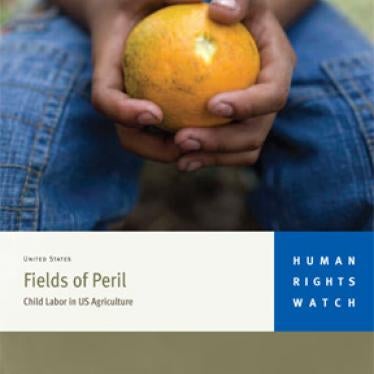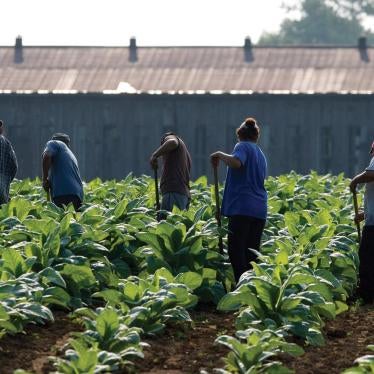Human Rights Watch, in conjunction with Student Action with Farmworkers, wrote the following letter expressing concern that a section of the North Carolina Commerce Protection Act of 2013 would stifle investigations that expose workplace abuses and deter employees from reporting abuses, including unsafe working conditions. Human Rights Watch has also signed a general statement of opposition to “ag-gag” laws.
The text of the letter is below.
--------
Senator Brent Jackson
North Carolina Senate
300 N. Salisbury Street, Room 523
Raleigh, NC 27603-5925
Re: Senate Bill 648 – NC Commerce Protection Act of 2013
Dear Senator Jackson and Members of the North Carolina Legislature:
Human Rights Watch and Student Action with Farmworkers write to voice our opposition to Section 1 of the North Carolina Commerce Protection Act of 2013, SB 648, and to express our concern that the bill would stifle investigations that expose workplace abuses and deter employees from reporting abuses, including unsafe working conditions.
Human Rights Watch is an independent organization dedicated to promoting and protecting human rights around the globe. We have documented the prevalence of workplace abuses perpetrated against meat processing workers and farmworkers in the US for many years, specifically in reports on the vulnerability of farmworker women to workplace sexual violence, child labor in agriculture, and abuses of workers in meat and poultry plants.[1]
In our research for these reports, which included extensive interviews with workers and employers in North Carolina, we found that workers in agricultural and meat processing workplaces are often highly vulnerable to workplace abuses, yet are often extremely reluctant to report these abuses due to fear of retaliation.
Section 1 of SB 648 makes it unlawful for a person to make false statements to gain employment in order to record images or sounds in the employer’s facility or to duplicate or otherwise capture documents in the facility. Although we did not conduct undercover investigations for our research, we are concerned that Section 1 of the proposed act would deter reporting of abuses precisely where reporting is most urgently needed.
First, SB 648 would criminalize the kind of investigations that have in the past uncovered public health threats and dangerous working conditions, often in workplaces where reporting of such abuses is rare.
Second, Section 1 of SB 648 is also likely to have a chilling effect on all whistleblowers and employees who seek to expose abuses, regardless of whether or not they intentionally sought employment with false information to conduct undercover investigations. US and international law protect the right of workers who experience workplace violations to seek effective remedies. Putting criminal penalties on efforts to document workplace violations could undermine free speech and allow violations to continue with impunity, putting North Carolina workers, consumers, and the general public at risk.
Given the enormous barriers workers often already face in reporting serious abuses, North Carolina should not enact new laws that impose additional barriers to reporting violations of state and federal laws on workplace safety, food safety, and animal cruelty. We therefore respectfully urge the North Carolina legislature to strike Section 1 of the Commerce Protection Act.
If you have any questions, please contact Grace Meng, US researcher, or Natalie Kato, Southern State Policy Advocate.
Sincerely,
Alison Parker
Director, US Program
Human Rights Watch
Melinda Wiggins
Executive Director
Student Action with Farmworkers
Melissa Bailey
Executive Director
NC FIELD
cc: Senate President Pro Tem Phil Berger
House Speaker Thom Tillis
Gary Salamido, Vice President – Government Affairs, North Carolina Chamber of Commerce
[1] These reports include Cultivating Fear (2012), available at https://www.hrw.org/reports/2012/05/15/cultivating-fear; Fields of Peril (2010), available at https://www.hrw.org/reports/2010/05/05/fields-peril-0; and Blood, Sweat and Fear (2005), available at htp://www.hrw.org/reports/2005/01/24/blood-sweat-and-fear-0.







